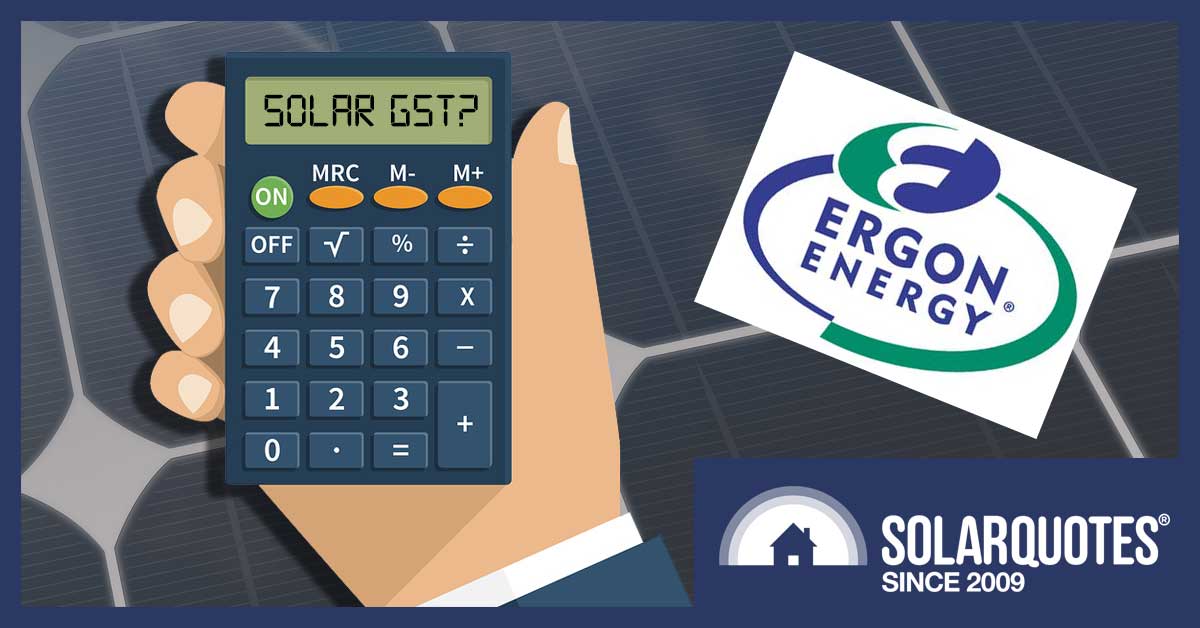
Ergon Energy say GST is included in their FiT. The Queensland Competition Authority say GST is not included in the FiT. Who is correct? And why won’t Ergon respond to our questions?
This post arises because of a query from a Queensland Ergon customer, who has discovered the solar feed-in tariff set by the state’s competition regulator doesn’t make provision for GST.
This doesn’t matter to residential customers – they’re not expected to account for GST on the electricity they sell back to the grid.
It’s a different story for business customers, however: electricity sent upstream to the retailer is just another business income, and like any other business income, it’s subject to GST.
What The Australian Taxation Office Says
When our reader e-mailed us about this, it sounded in error to me, so I checked with the Australian Taxation Office. Here’s a reply from an ATO spokesperson (there’s more detail here):
“A business that is registered for GST and supplies solar energy to the retailer (as part of that business) is liable to remit GST on the solar feed-in tariffs received for those supplies.”
The spokesperson elaborated that business owners are:
“required to remit GST on the taxable supplies on their Activity Statement. They may need information from the electricity retailer to calculate this amount.”
In the other direction – retailer supply to the solar power system owner – the spokesperson added that GST is calculated on:
“the full value of the electricity they supply to the solar owner, not on the net amount the solar owner pays to the electricity retailer. The electricity retailer has the GST liability on their supply of electricity to the solar owner, and the electricity retailer is liable to remit GST on this supply on their Activity Statement.”
In other words: your retailer will bill you for $1,200 worth of electricity (plus $120 GST), and if you sold $880 of electricity back under the feed-in tariff, you need to account for $880/11 ($80) in your BAS. Returning to the ATO’s advice:
“the electricity supplies made by the solar owner and the electricity retailer need to be accounted for separately. Where there are mutual supplies for consideration, the GST law does not allow the price for one supply to be reduced by the price of another.”
I’ll guess that most businesspeople either know this already, or don’t pay much attention to it because it’s a blip in the BAS that their accountant fires off every month, but there’s a wrinkle for our Queensland reader.
What The Queensland Competition Authority Says
He passed us an e-mail from the Queensland Competition Authority’s electricity team which is unequivocal on whether the feed-in tariff the authority sets includes GST:
“I can advise that the solar feed-in tariff determined by the QCA for regional Queensland does not include GST”.
Solar Quotes has sighted the customer’s bill, and can confirm that it includes the 44c per kWh set by the QCA under the state’s legacy Solar Bonus Scheme.
What Ergon Energy Says
That’s at odds, however, with Ergon Energy’s website, where both the business and residential FiT pages state that tariffs include GST. This is repeated for the three packages available – “Solar feed-in tariff for regional Queensland”, the “Solar Bonus Scheme”, and the “Solar time-varying feed-in tariff”.
Our informant checked his bill against the QCA tariffs, and said it’s the same rate – meaning that of the solar feed-in tariff he gets from Ergon, he should be sending one-eleventh off to the ATO when he submits his BAS.
The only alternative, he told us, is for him to raise an account for the GST and send it off to Ergon, and we don’t suppose Ergon would welcome a bunch of tax invoices for the feed-in tariff payments.
In writing this post I tried to contact Ergon via its media office, by e-mail, phone call, and text message, but haven’t heard back. We’d welcome a response.

 RSS - Posts
RSS - Posts



It’s a difficult area. When I was doing comparisons on a spreadsheet between different providers this was the hardest element to check. AGL do not seem to include GST on their FiT. At least if you calculate the bills correctly. Either that or it’s the only charge they show on the bill with GST inc (but it says all GST ex). Because to calculate your bill correctly you must add all the other other charges together, add GST, then subtract the FiT then apply whatever discount is applicable to your deal (which means they also sneakily discount the FiT). Believe me -deciphering how utilities calculate an energy bill – well it took me a few times to figure out the correct formula.
My understanding was that utility companies got a GST exemption because they initially had to pay GST on subsidised FiT (eg when the NSW govt were contributing 45 odd cents to the FiT – I call them the “good ol’ days” 🙂
I think like any other business they should be forced to pay GST on any non-subsidised FiT. Residential customers won’t have a GST liability because it will be deducted from the GST charged. The only exception would be if they were in credit. And then it gets tricky.